Guide choose good salmon, how to prepare and preserve fresh salmon for a long time, properly
- Nhận đường liên kết
- X
- Ứng dụng khác
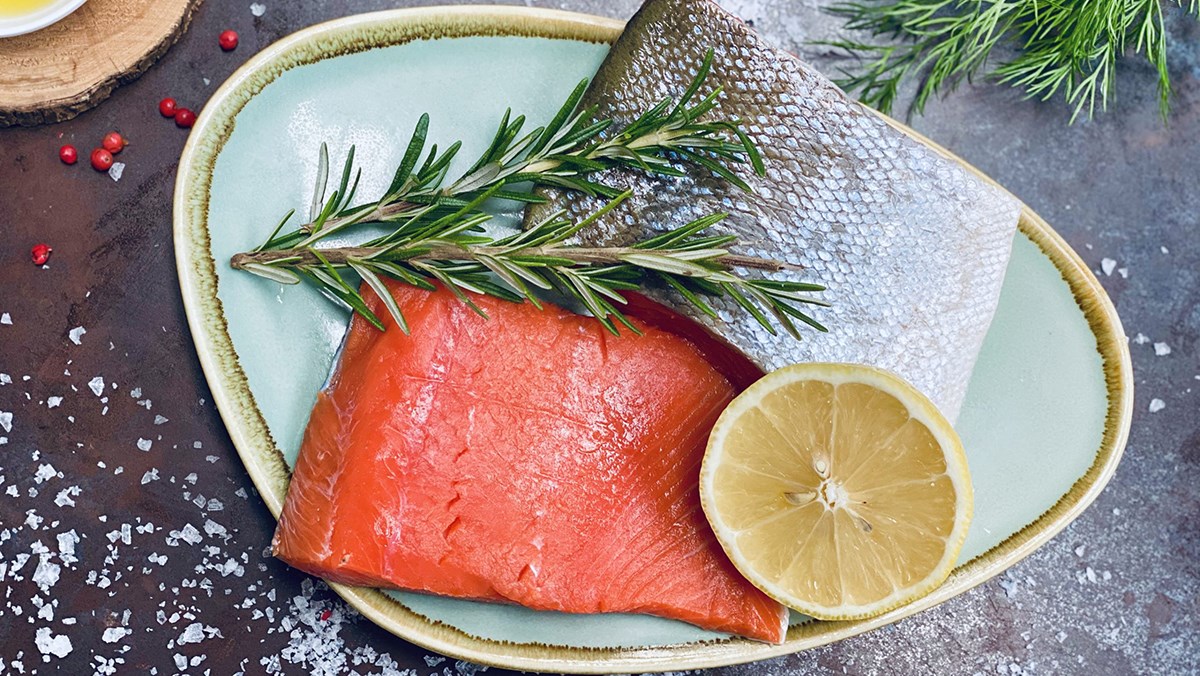
Guide choose good salmon, how to prepare and preserve fresh salmon for a long time, properly
Salmon is one of the foods that contain many nutrients that are very good for health. Join the Kitchen Tips section of we to find out how to choose to buy, how to process and how to preserve this food!
1. How to choose the right fresh salmon
For whole fresh salmon
First you need to observe the ankle part. Observe that the fish's eyes are clear, not opaque and turn yellow, it is a fresh fish. In addition, fresh fish is fish with a slightly swollen ankle, if the eye is concave, the fish is not delicious.
The fish body ensures brightness and shine. The fish skin is close to the body, not peeling, bumping or scratching.
For gills, you can easily see with the naked eye. If the gills are bright red and not torn, the fish is fresh. Do not buy fish whose gills have turned dark red or pale in color. In addition, the fish gills also do not have the accumulation of bruises.
Fresh fish has a characteristic fishy odor and no foul or chemical odor. Besides, fish with fresh color, not dull or turning lighter, fish with good elasticity is fresh fish.
Hold the fish tail and shake it vigorously to check the firmness of the fish's backbone. If the hand feels firm, not loose, the fish is delicious. The bent tail does not show wrinkles, the fish is fresh.
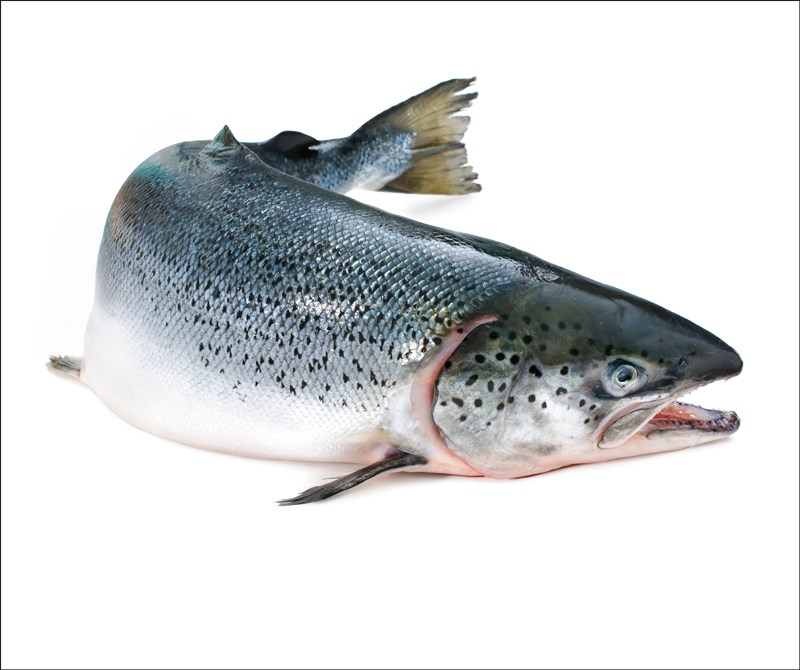
For fish that has been filleted
Fresh salmon flesh should be bright pink or orange. If the meat turns darker, it means that the fish meat is spoiled or about to go to the stage of decomposition.
Besides, delicious meat will have extremely good elasticity. When pressing on the fish meat, there are dents but quickly return to the original state of fresh fish meat.
Observe that the surface of the meat is dry, without any moisture or strange discharge. The fat veins on the body of the fish are evenly colored and bright without tarnishing or brown spots.
In addition, fresh fish fillet will have a characteristic aroma, no strange smell or blackness.
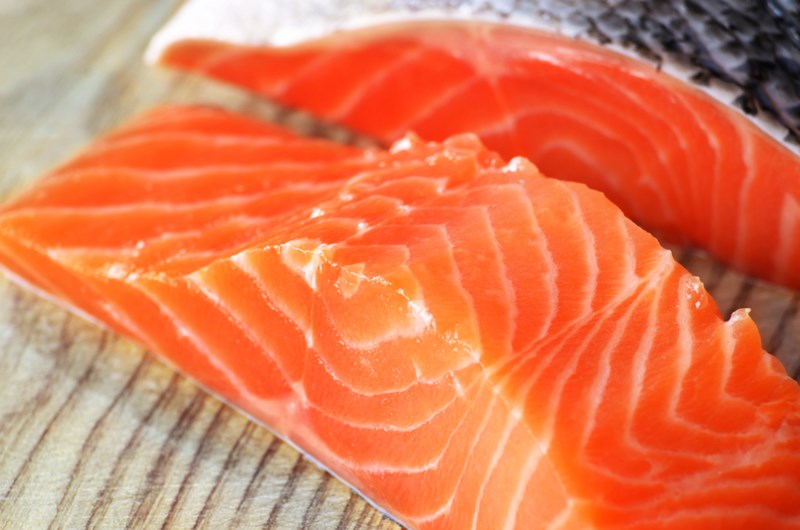
How to distinguish fresh salmon from frozen salmon?
Fresh salmon is salmon that is stored at the ideal temperature within the first 15 days of being caught. After being caught, salmon will have to go through many stages such as transportation, preliminary processing, ... until it reaches consumers. Therefore, using salmon in the first 7 days is safe and the meat is the best.
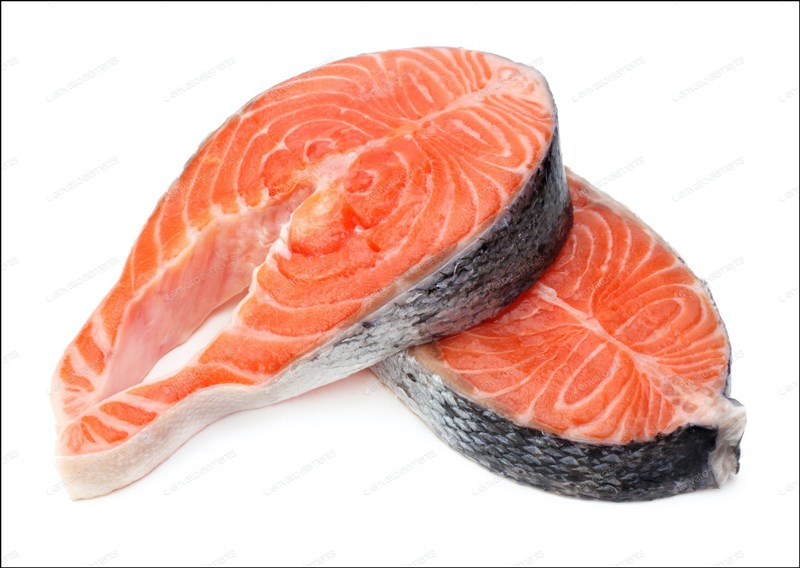
Frozen salmon is fish that has been preserved by freezing and storing in the freezer for long-term use. This way the salmon can be used for about 2-3 months after being caught.
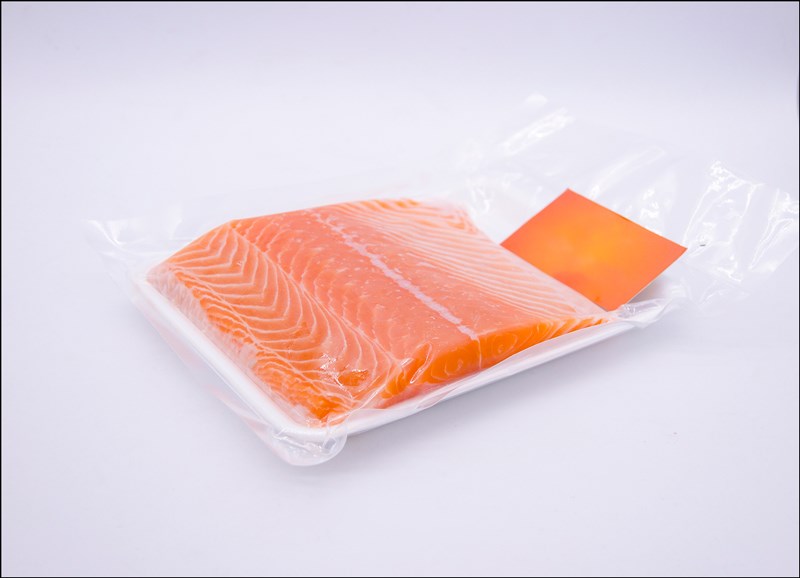
Differentiate between fresh salmon and frozen salmon
With your senses, you can tell the difference between fresh salmon and frozen salmon. Below is a general distinction for both whole fish and fillets.
| Fresh salmon | Frozen Salmon | |
| Sight | The fish eye is convex and transparent. The gills of the fish are pinkish red and not slimy. Fresh fish flesh has a natural orange to red color. | The eyes are recessed inward and opaque. The gills of the fish are dark brown and viscous. The fillet is lighter in color. |
| Tactile | The meat is tender and has good elasticity. Touch has a dent and then quickly return to its original state. | Firmer, firmer meat. When touching the meat, it leaves no dents. |
| Smell | Fish meat has a natural fishy smell, not too strong. The face of the fish fillet is dry, smooth, and does not flow. The tail and body of the fish are firm, not soft. | There is no longer a characteristic aroma, gradually turning to a rancid smell. The fish meat is a bit wet and no longer smooth. The fish bones are easily removed and the bones are not strong. |
| Taste | When eaten, the meat is more fragrant, tender and very tasty. Fish meat has a certain toughness and is very fragrant | The taste of fish meat is slightly pale, gradually losing its characteristic flavor and no longer fatty. Fish meat is more friable and no longer crispy. |
| Nutritional value | Maintains the inherent nutritional value of salmon meat such as vitamins, omega-3, DHA and other minerals | Gradual loss of nutritional components in salmon due to transportation and storage. |
| Price | Whole fresh salmon ∼ 400,000 VND/kg Fresh salmon fillet 500,000 VND/kg | Whole frozen salmon ∼ 300,000 VND/kg Frozen salmon fillet ∼ 400,000 VND/kg |
2. How to prepare salmon clean and not fishy
How to prepare whole salmon
First, use a scalpel to cut the fish's belly, cut and remove all the intestines inside the fish's belly.
Then you use a very sharp knife and then cut down the direction from the head to the tail of the fish. You should control the knife to follow the fish's backbone to get all the meat, avoiding waste. You should also cut evenly and gently so that the cut is very smooth to help the fish meat evenly and without interruption.
After that, clean the scales on the outside of the fish. Place the fish on a large cutting board or a clean, dry flat surface. This will help prevent slipping, the fish will not move and have a large space for you to work easily.
After cutting off one side of the fish, you use one hand to stretch the fish skin, the other hand to use a real iron knife to cut the skin off. You cut from the tail of the fish to the belly of the fish, it will be easier to manipulate.
Finally, use tweezers to pick up all the bones that are still in the meat. Now you can cut the fish into large and small pieces depending on the taste of the dish you are about to prepare
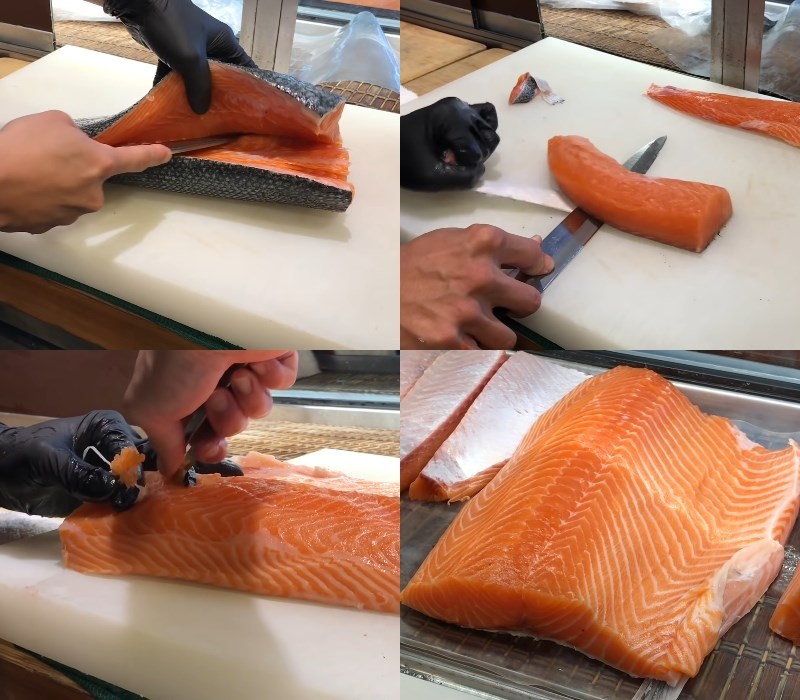
How to get rid of the fishy smell of salmon
Salmon has a characteristic flavor, but to enjoy the standard flavor you need to know how to remove the fishy smell of salmon. You can refer to one of the following ways:
Method 1: Remove the fishy smell of salmon with lemon
This method is very simple but extremely effective. You just need to prepare a cup/bowl of filtered water and add 2-3 tablespoons of lemon juice and 1 teaspoon of salt.
Gently stir and let it sit for about 30 seconds to 1 minute, then rinse with clean water. You can use a slice of lemon that has just taken the water to rub and gently massage on the fish meat to make the fish cleaner.
Finally, it is still to rinse with clean water, then use a paper towel or clean towel to dry the surface of the fish. The acids in lemon will eliminate the fishy smell of fish very effectively.
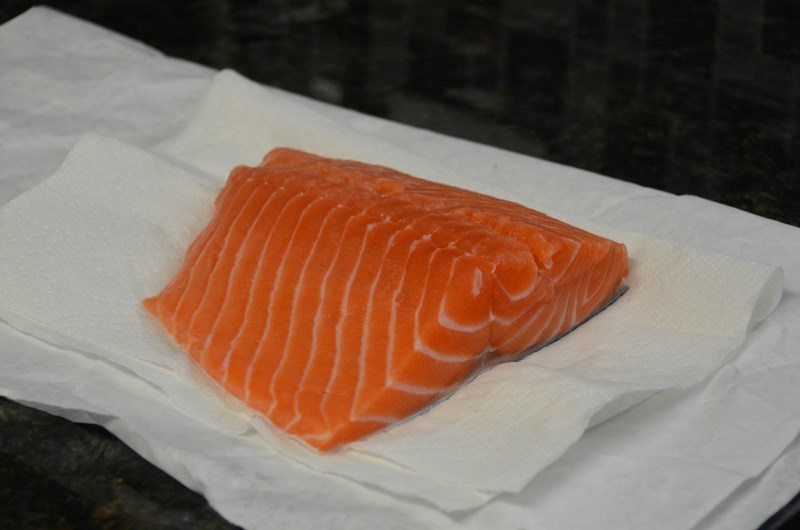
Method 2: Remove the fishy smell of salmon with fresh milk
Fresh milk has a very effective deodorizing effect. You just need to put the fish meat in a bowl and then pour the fresh milk into the bowl so that the fish meat is completely submerged.
Proceed to soak the fish in milk for about 10 minutes, then rinse with clean water and let it dry.
Compounds in milk can help food in general and salmon in particular lose its fishy smell quickly. Not only that, fresh milk also helps salmon to increase the flavor.

Method 3: Remove the fishy smell of salmon with alcohol and ginger
This method is also extremely simple and equally effective as the two methods above.
All you need is to find some ginger in the house and then mince or smash them. Then put in a bowl and pour in white wine, if you don't have wine you can also replace it with vinegar .
Next is to put the piece of salmon in a bowl, the wine (or vinegar) can be mixed with a little clean water to submerge the fish.
Soak the fish in the mixture for about 7-10 minutes, then take it out and rinse it with cold water to be able to process attractive dishes.
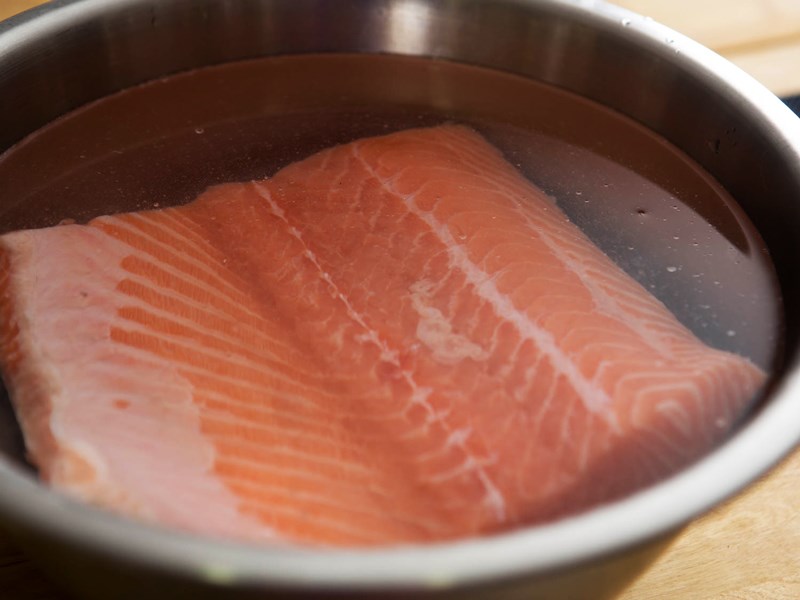
How to defrost frozen salmon
You can refer to the following 3 ways to choose a suitable and safe defrosting method for yourself
Method 1: Defrost salmon in the refrigerator
For this method, you need to take the fish from the freezer to the outside environment about 12 hours before processing. The time may be longer if the volume of salmon is larger, for example, fish weighing 450 - 700g should be taken out 24 hours before.
Remove the bag or packaging containing the fish, use foil or food wrap to wrap tightly around the fish to prevent bacteria from contacting the surface of the fish and multiplying, which will cause rancidity.
Put the fish in a bowl and place it in the refrigerator at a temperature of 2 - 5 degrees Celsius. Be sure to keep the fish away from other foods in the refrigerator so that they will smell.
You observe until the fish is soft, then take it out and that's it.
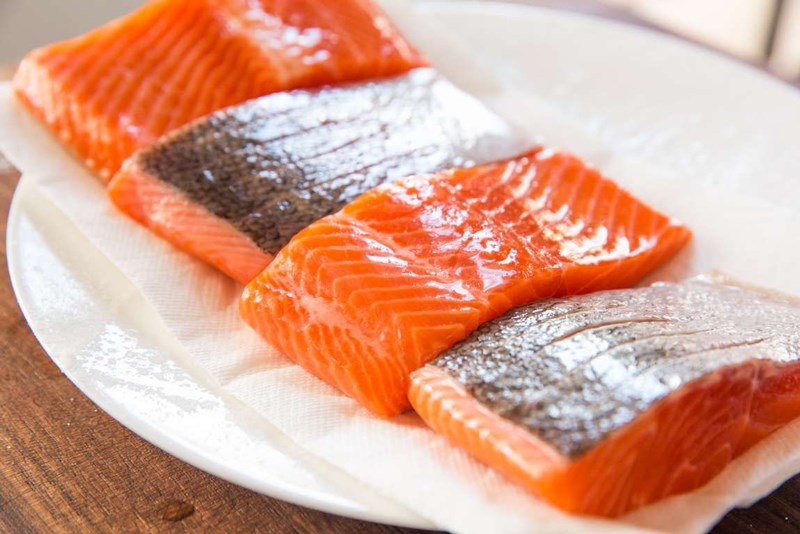
Method 2: Defrost salmon with cold water
With this method, you need to take the fish out of the freezer about 30 minutes before processing. The larger the volume, the more time.
As with the method above, you need to empty the bag or container of salmon. Wrap the fish with paper or plastic wrap to prevent bacteria from multiplying.
Then soak the fish in a bowl, basin or soak it directly inside the sink. About 30 minutes, you proceed to change the soaking water once.
Finally, wait until you feel the fish becomes softer than it can be processed.
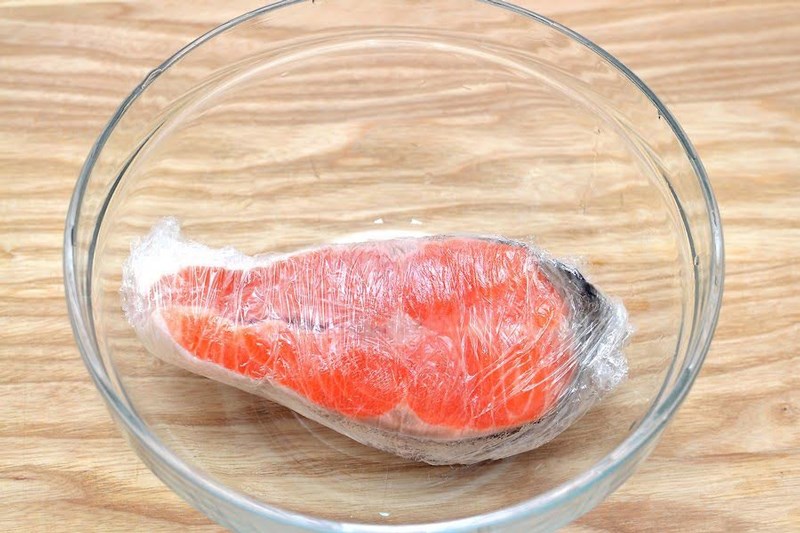
Method 3: Defrost salmon in the microwave
The first thing you need to do is take the fish out of the freezer and remove all the packaging, bags or boxes of fish.
Wrap the fish with tissue paper, then place the fish in a glass dish. Save the plate to be large enough so that the fish does not come out and the fish fits in the center of the plate.
Put the fish in the microwave and turn on the defrost mode on the microwave for 4-5 minutes. For fish weight of about 450 - 500g, the capacity used is about 30%. You can adjust accordingly based on the weight of the fish.
After about 2 minutes, turn off the oven, then carefully flip the fish over. Gloves can be used to avoid burns. Then continue to place in the oven until the remaining time is up.
Finally, take the fish out and leave it out in the kitchen until the fish is soft, then proceed to cook it right away!
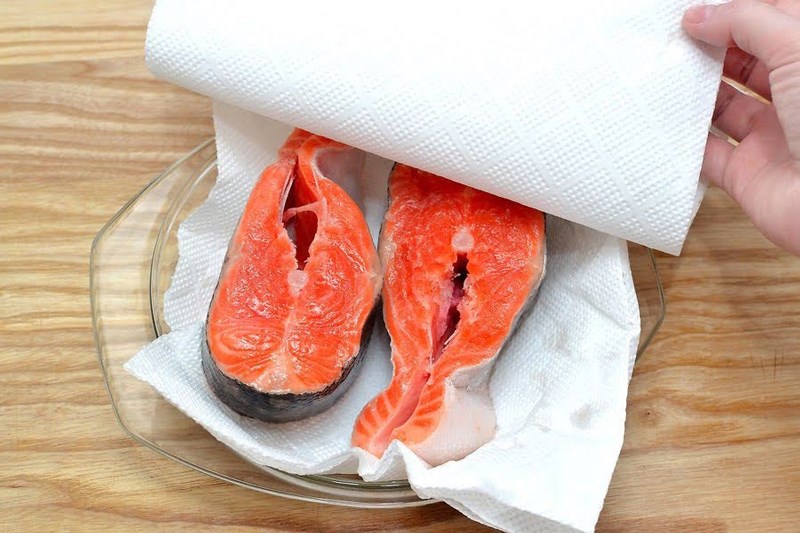
Notes when defrosting salmon
- For thawing whole salmon, at the end of the process you should check to see if there are any ice cubes inside the fish's belly. If you still have, you can bring the fish to flush with clean water so that the ice falls out and you can go to the kitchen to process it.
- Salmon after being defrosted needs to be processed immediately to avoid affecting the taste of the fish and creating an environment for bacteria to grow.
- You should not defrost fish in warm or hot water. Avoid unfrozen fish and do not give bacteria a chance to grow.
- Never refreeze fish that has been defrosted. Because home conditions cannot be as standard as frozen facilities, this is one of the reasons why fish meat is rotten and tender even after you re-freeze it.
- Therefore, you need to consider the amount of salmon that needs to be defrosted, so that it is enough to avoid waste and safe for health.
- To be on the safe side, you should record or mark the packing date before you store it in the freezer. And you should only use fish that has been frozen for no more than 8 weeks by the time you defrost and use it.
How to properly store salmon, keep it for a long time?
If you're buying fish (fresh or fillet) to use during the day, simply freeze - for whole fish and refrigerate - for fillets. Fish preserved in this way should only be used within 24 hours.
If you decide to not use it all within a day, you should put the fish in the freezer compartment of the refrigerator (also known as freezing). Freezing fish can help preserve it for 2-3 months.
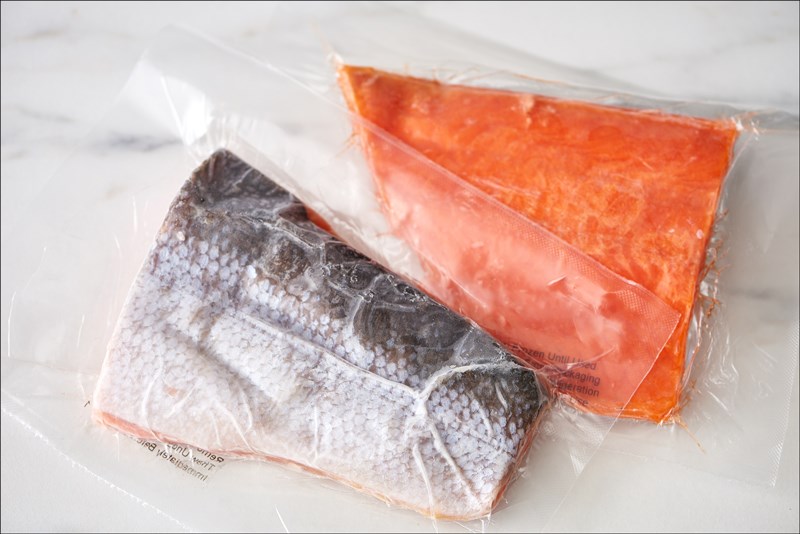
How to freeze salmon at home safely and quickly
First you need to thoroughly prepare the fish to be frozen. Can be washed with dilute salt water or to disinfect the bacteria that naturally exist on the fish. This helps the fish to be preserved longer and safer.
Next, you apply a little salt on the surface of the fish to avoid bacteria and retain the inherent substances of the fish.
Put the fish in a plastic bag used to supply copper and put the fish in the refrigerator to freeze the fish. This process needs to be kept continuous, avoiding interruptions to ensure the quality and safety of the food.
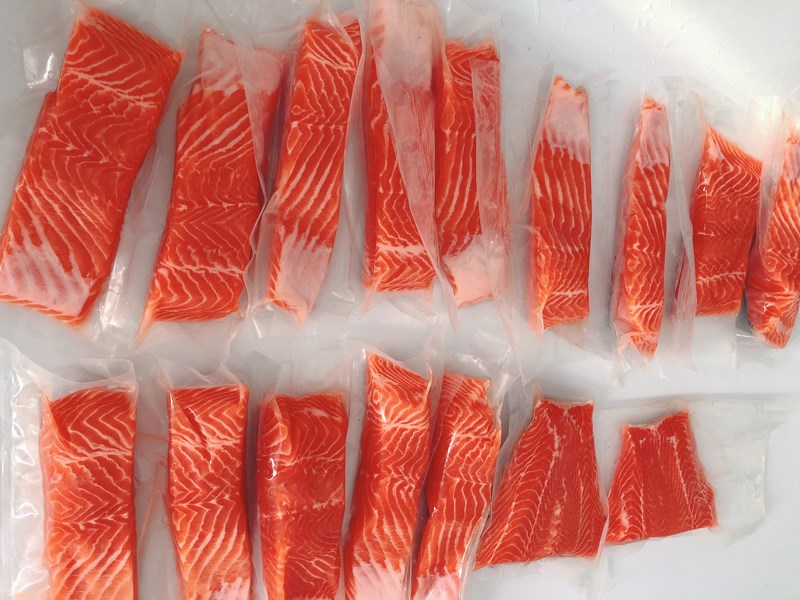
- Nhận đường liên kết
- X
- Ứng dụng khác
Nhận xét
Đăng nhận xét